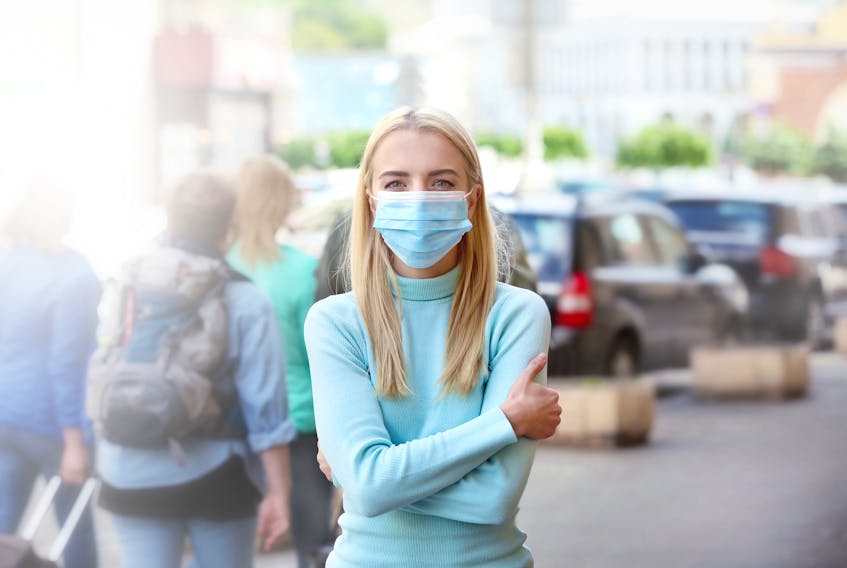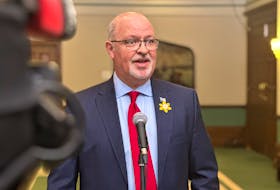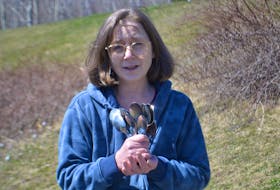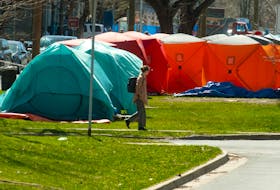Even before the COVID-19 pandemic, Ashley Dawe, a former Halifax resident who has lived in Seoul, Korea for the past decade, had a supply of masks on hand in case she ever needed them.
And she wasn’t the only one.
“Masks have been a household item here for a while,” Dawe said. “People wear them for a number of reasons, but the biggest one is that micro-particle pollution and yellow dust are serious concerns here during a large portion of the year.”
Even so, Dawe never actually wore the masks herself until COVID-19 broke out in South Korea earlier this year. While South Korea was one of the first countries to experience a major outbreak of the coronavirus, as of Aug. 20, the country has had only 16,346 confirmed cases and 307 deaths, far fewer than countries like Canada.
“Korea went from being one of the first countries to have a huge spike in cases to being down to single-digit daily new case numbers in May,” Dawe said.

South Korea has a population of more than 50 million and is densely populated, so Dawe believes social distancing was virtually impossible. And while the country did implement measures – including mandatory mask-wearing in most public places - it didn’t have a ‘full-scale’ lockdown, as cafes, restaurants and other businesses remained open.
“I can only guess that masks played a big part in slowing the spread,” Dawe acknowledged, but she believes the numbers tell the story.
“Wearing a mask seems like a small price to pay to protect yourself and your family, friends, and neighbours and to not be in full lock-down.”
Mask effectiveness
Here on the East Coast, many people are wearing masks to help prevent the spread of COVID-19. A number of large corporations, such as Wal-Mart, have recently instituted a mandatory mask rule for customers. The provincial governments in Nova Scotia and Newfoundland and Labrador have made wearing masks mandatory in most public places.
The science behind the effectiveness of masks is arguably evolving as quickly as the pandemic itself, as revealed in some recently-published Canadian studies on the matter.
Canadian Family Physician magazine, which is published by the College of Family Physicians of Canada, recently released a peer-reviewed study entitled “Masks for prevention of viral respiratory infections among health care workers and the public.” The research was in the form of a systematic review, considered the highest level of evidence and involves analyzing a collection of studies on one topic.
What was notable about this review was that none of the studies being analyzed involved COVID-19 patients; even so, the study did conclude that there was a possible reduction of the risk of flu-like illness when masks were used at least a few hours a day by a population in a specific area.
That observation was based on two studies that were most closely aligned with mask use in real-life community settings. Those studies looked at 1,683 people who were students in university residence halls.
The results showed that, over a six-week period, the risk of catching a flu-like illness without a mask was at 25 per cent. But wearing the mask during the same period would reduce that risk to 21 per cent – a change of four per cent.
As Dr. Michael Allan, a University of Alberta professor and one of the authors of the study, explained, “It (four per cent) may not sound like a lot, but these people were only wearing a mask intermittently.”
He added that those studies didn’t take into account hand-washing or social distancing.
“If I wear a mask, will it harm, hurt or be indifferent? It’s not going to harm you in any serious way, and there is a good chance that it will help,” he said.
But while this result holds some promise, the final report notes too few people got sick to show a difference in some specific outcomes (like confirmed flu), and the definition of what was considered ‘flu-like illness’ was inconsistent between trails. As well, the study did not answer whether cloth masks work in a community setting, whether wearing a mask would prevent others from getting sick, and whether masks prevent COVID-19 infection.
Regarding that last point, Allan believes it’s reasonable to assume masks would be similarly effective for COVID-19, “but there’s no confirmation of that, yet.”

Questions remain
The systematic review only considered randomized control trials. Allan pointed out that observational studies performed in the past stated that masks have been shown to work in reducing flu-like illness, but questions remain.
For one, in those past studies, it is uncertain whether the reduction of infection is because of the masks themselves, or because the people wearing them are more careful to avoid infection.
The systematic review also looked at studies involving surgical masks at home after a household member becomes sick. In all three scenarios – only the sick person wore a mask, only healthy household members wore masks, and both sick and healthy household members wore a mask – there was no reduction in risk of getting a flu-like illness or confirmed influenza. In these studies, people were already sick for up to three days before they started wearing a mask.
Allan points out that randomized controlled trials are very difficult. He said if one were to do such a large-scale study even during a normal flu season, you’d need “thousands of people” who would be willing to wear masks, and you’d have to compare those results to a control group who would not be wearing masks.
“You’d need a high prevalence of disease, and you’d need a whole community to be researched.”
A recent systematic review, funded by the World Health Organization and published by the medical journal The Lancet, did include COVID-19 patients. But the WHO-sponsored review used only observational studies, considered a less robust form of evidence.
The evidence leaned toward mask use in areas that had some risk of transmission, but the report noted that “robust” randomized control trials are needed to “better inform” the evidence for masks and eye protection.
East Coast reaction
In any case, the subject of masks has elicited strong feelings among many Atlantic Canadians, especially on social media. It isn’t too difficult to find opinions ranging from people accusing anti-maskers of being a threat to the lives of others, to people who oppose masks falsely claiming that wearing masks is harmful.
Dr. Christiana MacDougall, associate professor of sociology at Mount Alison University in Sackville, New Brunswick, wears a mask in public places and would like to see more people wearing them. But she also thinks that people who criticize others for not wearing masks are focusing on the wrong thing in a society that up to this point has focused on individual responsibility about health matters.
“We should look up to structures rather than down to individuals,” MacDougall said. “Our society has overemphasized us being responsible for ourselves but doesn’t pay attention to how much we are responsible for others.”
The pandemic has seen a number of people express distrust for institutions such as government and the pharmaceutical industry. MacDougall brought up a fact from earlier in the pandemic when many health officials advised the public against mask use, only to change their stance several months later, as an example of why some may distrust certain institutions.
While some say the distrust comes from an anti-science perspective, MacDougall says that’s not always the case.
“I’m very pro-science, and I also am somewhat critical of these institutions,” she said. “It’s very good to be sceptical of the pharmaceutical industry – the opioid crisis involved bad actors that have undermined the credibility of the pharmaceutical industry and haven’t been held to account.”
But MacDougall says there’s also a lack of scientific literacy in our society. She says we need to accept that science evolves, including the science on masks, and “change isn’t a threat to your ability to control your own life.” Even though many resources have “accelerated” as a result of the pandemic, she adds, the research on mask effectiveness or a vaccine will still take time.
“Science is more like a cruise ship than a speed boat,” she said.
MacDougall doesn’t think governments should punish people for disobeying mask mandate orders, but she does think such mandates are necessary in contributing to a healthy citizenship.
“It’s saying, ‘hey, we think this is important and this is why.’ It sets some kind of expectation around society,” she said.
Back at the University of Alberta, Allan says he doesn’t envy government officials charged with making decisions such as whether to make face masks mandatory.
“They (the government) know people love liberty, but they also have to be conscious about the health of the population,” he said.
He said governments need to tailor their policies to the current risk.
“Most places are seeing an uptick … and we want (the numbers) to remain low. The more dangerous the situation, the safer you want to be.”









